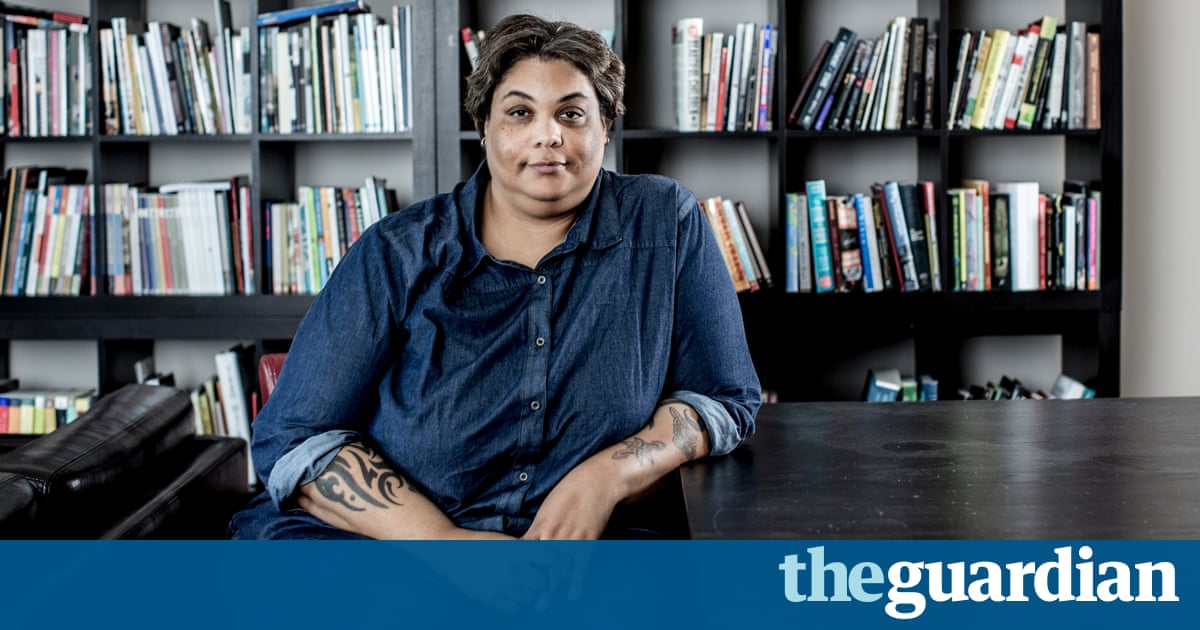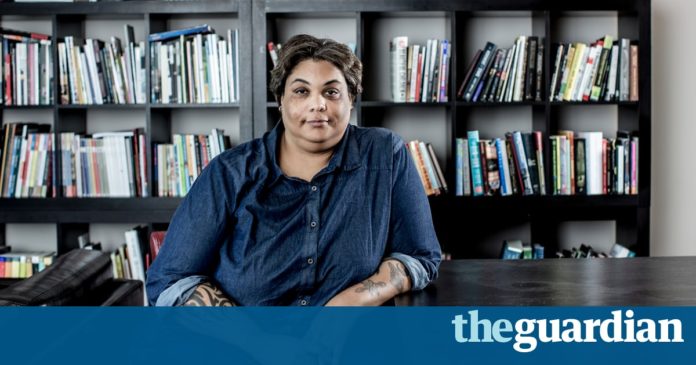A catalogue of horrors and public humiliations, Gays memoir responds to societys condescension and disgust about her body size

This is a book its author Roxane Gay has, over many years, earned the right not to publish. Even though she has found great success as an essayist, writer of fiction and university teacher, and attracted a large, passionate online following, its clear from her account that her weight is still the first thing strangers notice about her, and that she must spend much of her time dealing with their unsolicited responses to it. These range from rude to abusive, encompassing all sorts of casual mockery, faux concern and outright aggression along the way.
Shopping for clothes or food, visiting a restaurant or getting on a plane frequently involve a humiliating ordeal. Doctors not only patronise her but routinely refuse her basic care. Simply leaving the house means navigating a physical and emotional obstacle course. No doubt Gay is thoroughly sick of being reduced to her body and of enduring constant inquiries, prejudices and criticism, and she has evidently worked hard to make space for herself to talk and write about other things. People asking those kinds of questions dont deserve an answer, and yet here Gay has decided to give them one.
Hunger comprises at least two stories: a partial but more or less linear telling of Gays life so far, and a more halting, spiralling description of her everyday experience as a fat woman. The first of these hinges on the horrifying rape visited on her as a 12-year-old by her boyfriend and several of his friends. Gay blames herself, and her suffering is compounded when the boys report their version of events to their peers at school; she keeps hers quiet, unable to say anything about it to her family. The brief evocation of her childhood before this point conjures an almost fairytale-like atmosphere of love and optimism, peopled with adoring parents and siblings. I fell asleep most nights, Gay writes, flush with the joy of knowing I belonged to these people and they belonged to me.
Afterwards, everything changes: she begins to overeat and her weight gain is swift and dramatic, to her familys dismay. Various attempts to reverse it, some undertaken willingly, others under parental pressure, never last long, and both the traumatic event and her highly visible response to it overshadow everything else that happens to her. Gays mother and father are well-to-do Haitian Americans who clearly have high expectations of their children. Gay, who attends an elite boarding school followed by Yale, drops out and moves to another state without letting anyone know where she is. She eventually completes a PhD and garners acclaim as a writer, but this book is still a catalogue of horrors large and small: there are abusive relationships and public humiliations. Particularly striking are the depictions of what its like for Gay to go to the gym or on a date. Unable to fit on a restaurant chair and denied a more comfortable booth, she spends an entire meal holding herself up in an excruciating squat. At the supermarket, random people entitle themselves to remove foods they deem unsuitable from her cart.
Gays tone shifts between a breezy, conversational style and something harsher, and she recounts painful events in short, almost incantatory sentences: There was a boy. I loved him. His name was Christopher. Thats not really his name. You know that. She occasionally makes light of the cliches that surround public discussion of weight loss (though she herself cant avoid some of these). Scoffing at Oprah Winfreys metaphor of the cheerful, skinny alter ego lurking inside every fat person, she notes, I ate that thin woman, and she was delicious but unsatisfying.
But in general theres not much to laugh about. Gay alludes to or summarises difficult conversations, but rarely recounts them in full, and the overall effect is often one of claustrophobic intensity, as if the reader is trapped inside her head much the way she describes feeling caged in her flesh. Some of the books repetitions may be due to its origin in shorter pieces written for various publications, but most reflect the near-constant frustrations of living in a body the world both fixates on and refuses to accommodate. One of the few scenes rendered in detail is the gruesome early description of her father taking her to a group consultation with a doctor who performs gastric bypass surgeries. They must watch a video of patients steamy red and pink and yellow insides being carved up in an exorbitantly expensive and devastating procedure that even in the best case scenario will leave them permanently malnourished.
Though Gay does not owe anyone a single explanation of her size, she gives her readers an abundance of them. If some can seem a little too neat and familiar, that effect is complicated by how many accumulate, often directly contradicting each other. She characterises her initial weight gain as an attempt to take up more space, growing bigger and more powerful, but also as an effort to disappear and avoid ever attracting male attention again. She deliberately eats to create a protective shield of flesh, or simply cannot resist using food to soothe unbearable emotions. Gays mixed feelings often feel inevitable, though, in a culture that gives fat women no safe place to stand: you must feel bad about your size, but not enough to make anyone else uncomfortable; you must feel good about yourself as you are, but not too good. I am a product of my environment, she writes, explaining why her feminist convictions cant protect her from the cycle of selfblame, from longing to be thinner and accusing herself of weakness or lack of discipline when her body doesnt change.

Most of what Gay endures is neither her fault nor within her control, but since she believes society will not change fast enough, if at all, she makes no apology for yearning to adjust herself to it. And of course, much of the more or less veiled fear and disgust expressed by others is a self-fulfilling reaction to their own conditioning: People know how they see and treat and think about fat people and dont want such a fate to befall them. The book is crammed with agonising ironies, some more strongly emphasised than others. Gay gains weight as an outward expression of her unhappiness, but those around her dont get the message, and only make her more miserable in their reactions to her changing body. In trying to develop a defence mechanism after her rape, she inadvertently invites half a lifetime of invasive threats to her physical autonomy and violations of her consent. When her parents want her to go on a liquid diet or to a fat camp, she agrees because I had learned that saying no meant nothing.
As she has before, in her hit essay collection Bad Feminist, Gay proclaims her refusal to represent anyone but herself. Among other things, that means she isnt interested in trying to make anyone feel better including other people of size who would rather not hear that she hates her body and blames herself for her inability to change it. This is not, as she notes repeatedly, a story of triumph neither of triumphant weight loss nor triumphant self-acceptance.
Stories that skirt those two possibilities are far rarer than they should be, and the exceptions, whatever their individual failings, stick in the mind. Reading Hunger reminded me of radio producer Elna Bakers 2016 account of her own extreme weight loss and its aftermath, which in some ways holds up a funhouse mirror to Gays experience. Its only after losing a huge amount of weight that Baker fully discovers the miseries the world inflicts on fat people. As a thin woman, she finds her love life, job prospects and everyday existence suddenly transformed. And she encounters head-on the stubborn denial that enables other people to enforce sadistic norms: when Baker insists to her husband that hed never have fallen for her at her previous weight, he tries to weasel out of it, suggesting that all the benefits Baker derives from being thin are simply due to how much happier and more confident she must now feel. But that isnt true, she says she was fine before, whereas now she must live with the knowledge that her new life and relationship require her to keep up an unnatural (and unhealthy) struggle with her weight for ever. Bakers story helps shed light on one of the most intractable knots in Hunger. Gay knows that losing the weight would not solve everything or grant her happiness, and yet she longs for the entirely different, less painful life she imagines she could have had without it.
Early in the book, Gay characterises it as a confession, that term so often flung as an insult at women who write about themselves. These, she writes, are the ugliest, weakest, barest parts of me. Its more a provocation than a promise. There are certainly flashes of confession, passages in which Gay lays out, say, the precise effects her rape has had on the formation of her sexual desires. But mostly she is not prepared to be so bare and weak as all that. Its the world around her that comes off as out of control in its appetites hate-filled, obsessed with womens body parts, eager to punish what it helps create.
Hunger is published by Harper. To order a copy for 11.89 (RRP 13.99) go to bookshop.theguardian.com or call 0330 333 6846. Free UK p&p over 10, online orders only. Phone orders min p&p of 1.99.
Read more here: http://www.theguardian.com/us



